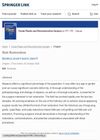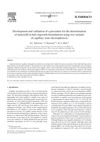January 2025 in “Anais Brasileiros de Dermatologia” Male pattern baldness worsens with age and can be treated with medications like minoxidil and finasteride, but side effects and personalized care are important.
 December 2024 in “Journal of Education Health and Sport”
December 2024 in “Journal of Education Health and Sport” Too much sugar harms skin, causing wrinkles and acne, but a low-sugar diet can help.
November 2024 in “Psychoneuroendocrinology” Testosterone increases hair testosterone levels, stress raises hair cortisol, and relationship status affects hormone levels.
 October 2024 in “Dermatologic Surgery”
October 2024 in “Dermatologic Surgery” PRP and PRF show promise for hair growth but need more research for consistent and safe use.
October 2024 in “Our Dermatology Online” Mitochondrial dysfunction links metabolic syndrome and inflammatory skin diseases, suggesting targeted therapies and lifestyle changes.
 April 2024 in “Archiv EuroMedica”
April 2024 in “Archiv EuroMedica” Platelet-Rich Plasma therapy helps increase hair density and regrowth for some types of hair loss.
 April 2024 in “Journal of translational medicine”
April 2024 in “Journal of translational medicine” MJ04, a new compound, effectively promotes hair growth and is a potential topical treatment for hair loss.
March 2024 in “Current issues in molecular biology” Personalized medicine in dermatology uses molecular biomarkers to improve diagnosis and treatment but needs further advancements for practical use.
November 2023 in “Cosmetics” Rice derivatives in conditioners protect and improve hair health.
 August 2023 in “International Journal of Molecular Sciences”
August 2023 in “International Journal of Molecular Sciences” Liposomes show promise for delivering CRISPR for gene editing but face challenges like delivery efficiency and safety concerns.
 July 2023 in “International Journal of Cosmetic Science”
July 2023 in “International Journal of Cosmetic Science” Biopolymers are increasingly used in cosmetics for their non-toxicity and skin benefits, with future biotech advancements likely to expand their applications.
 May 2023 in “Metabolites”
May 2023 in “Metabolites” Myo-inositol plus α-lactalbumin works better than myo-inositol alone for improving symptoms of PCOS.
 May 2023 in “International Journal of Trichology”
May 2023 in “International Journal of Trichology” Low-dose oral Minoxidil is an effective treatment for hair loss with minimal serious side effects.
December 2022 in “Journal of Sulaimani Medical College” Sleeve gastrectomy leads to significant weight loss and health improvements with few complications.
 January 2022 in “Clinical Cases in Dermatology”
January 2022 in “Clinical Cases in Dermatology” Stress can cause temporary hair loss, which usually gets better after the stress is gone.
 December 2021 in “Revista da Sociedade Portuguesa de Dermatologia e Venereologia”
December 2021 in “Revista da Sociedade Portuguesa de Dermatologia e Venereologia” Imbalance in scalp bacteria can affect hair and scalp health, potentially leading to conditions like hair loss, psoriasis, and dandruff.
 October 2020 in “Springer eBooks”
October 2020 in “Springer eBooks” Hair restoration has evolved to use follicular units for more natural results, moving away from older methods like large plug grafts and scalp reductions.
January 2023 in “Frontiers in Medicine” ALRV5XR is the most effective hair regrowth treatment at 24 weeks.
 September 2023 in “Biology of reproduction”
September 2023 in “Biology of reproduction” New testosterone analogs show promise for male contraception with better activity and potentially fewer side effects.
 25 citations,
June 2022 in “Developmental cell”
25 citations,
June 2022 in “Developmental cell” Overactivating Hedgehog signaling makes hair follicle cells in mice grow hair faster and create more follicles.
 34 citations,
May 2007 in “Neuroscience”
34 citations,
May 2007 in “Neuroscience” Finasteride reduces alcohol withdrawal severity in male mice but increases it in female mice.

Human hair keratins can self-assemble and support cell growth, useful for biomedical applications.
 36 citations,
September 2019 in “Journal of Herbal Medicine”
36 citations,
September 2019 in “Journal of Herbal Medicine” Herbal nano-formulations show potential for effective skin delivery but need more research.
 21 citations,
January 2012 in “Journal of Pharmaceutical Sciences”
21 citations,
January 2012 in “Journal of Pharmaceutical Sciences” Desolvation of finasteride depends on environment and technique.
 18 citations,
July 2009 in “Drug Metabolism and Disposition”
18 citations,
July 2009 in “Drug Metabolism and Disposition” Finasteride breakdown products found in bile and urine, helps understand drug safety and effectiveness.
 14 citations,
May 2005 in “Farmaco”
14 citations,
May 2005 in “Farmaco” A method was created in 2005 to identify minoxidil, a hair growth ingredient, in products using two types of capillary zone electrophoresis, and it found that most products had about 2% minoxidil.
 2 citations,
February 2024 in “Nature cell biology”
2 citations,
February 2024 in “Nature cell biology” Mechanical forces are crucial for shaping cells and forming tissues during development.
35 citations,
November 2021 in “Journal of nanobiotechnology” Thymol-loaded nanoparticles are a promising, natural treatment for acne that avoids antibiotics and preserves healthy skin bacteria.
3 citations,
November 2021 in “Stress” Girls had higher stress hormone levels during school due to social and emotional issues, while boys had higher overall hormone levels with slight changes when school started.
 1 citations,
August 2023 in “Military Medical Research”
1 citations,
August 2023 in “Military Medical Research” Smart hydrogel dressings could improve diabetic wound healing by adjusting to wound conditions and controlling drug release.




















